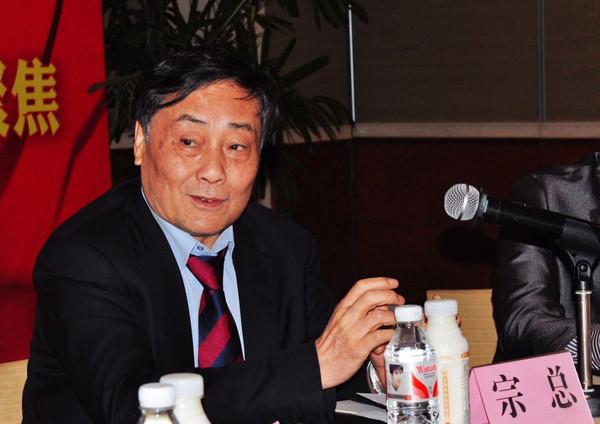China's richest man talks overseas investment
- By He Shan
 0 Comment(s)
0 Comment(s) Print
Print E-mail China.org.cn, March 4, 2012
E-mail China.org.cn, March 4, 2012
Zong Qinghou, crowned China's richest man by Forbes magazine in 2010, said in an interview with China.org.cn prior to China's annual National People's Congress, which begins on March 5, that his company, Hangzhou Wahaha, would cautiously increase its overseas presence this year.
|
|
|
Zong Qinghou |
Zong, 67, has no shortage of liquidity, thanks principally to the success of his beverage business. As a result, his interest in overseas markets has grown, and his company is currently in talks regarding planned investments in several countries, including Australia and South Africa.
His investment plan to buy a farm and build the facilities necessary to produce dairy products has been welcomed by the Australian government, who even offered to conduct market research for his company.
"The local government officials told me they will complete the research within three months," said Zong. "If everything proceeds smoothly, the new factory will be opened in west Australia in one year."
Mineral products have helped drive Australia's economy for many years. However, prices have begun to wobble amid uncertainty over growth prospects in China, and the Australian government, in a bid to fuel its economy, has begun to ease the limitations imposed on foreign investment in its farms.
However, not all companies have been as successful in their overseas dealings as Wahaha. Just a fortnight ago, Chinese company Shanghai Pengxin saw its plans to buy one of New Zealand's largest dairy farmers hit a snag regarding approval for the deal from the New Zealand government.
Compared with other Chinese investors and buyers, Zong's investments have always been executed with great care, and he has received some high-level business invitations.
The former president of the Philippines, Gloria Arroyo, invited the business tycoon to invest in the Philippines when the pair met in Hangzhou in 2008. Subsequently, Zong led a research party to the Philippines to investigate the potential for investment. He finally abandoned his plans due to concerns over political turmoil and social instability in the country.
In similar cautious fashion, business-savvy Zong has shied away from buying foreign problem assets, despite sensing numerous opportunities to buy Western assets hit by a sluggish economy.
"Don't rush to buy bankrupt Western firms, be careful," he said. "If even Western companies cannot pay their debts, how can we?"
Compared with many of China state-owned companies, Zong's privately-owned company has been more warmly welcomed abroad. This reflects a prominent problem facing Chinese investors: Chinese companies are not always welcomed overseas because state-owned giants are believed to be owned or subsidized by the government and therefore possibly helping the government to gain access to sensitive technology and natural resources.
Zong believes that such companies must deal with the outstanding issue of how to deal with such hostility and risk amid the current international economic turmoil.
He said: "As anti-Chinese sentiment is still rooted?in some people, China has to try to find a win-win solution to its pursuit of overseas investment."
Zong also suggested that, in bidding for "sensitive" assets, investors should prove they have relevant business experience and that the deal will bring substantial and foreseeable benefits to local people.
Zhou Dewen, director of the Wenzhou Small and Medium-Sized Enterprises Development Association, said China should encourage private rather than state-owned companies to invest overseas in order to reduce both foreign sensitivity and hostility to such deals.
In agreeing with Zhou, Zong expressed his concern that private companies are less able to guard against risks. To address the problem, Zong suggested that private companies cooperate with each other in order to better manage the challenges and risks involved in making overseas investments.
China's rising economic power has helped its companies gain clout in the foreign markets, however their investment plans face political opposition from foreign countries as well as fierce competition from such countries as Japan, whose strong Yen puts it in an advantageous position in terms of buying overseas assets.
China's non-financial outbound direct investment (ODI) rose 1.8 percent year-on-year to US$60.07 billion in 2011, according to figures released by the Ministry of Commerce (MOC) last month.
A study released last year by the Asia Society in New York predicted that over the coming decade China could invest as much as $2 trillion in overseas companies and projects.
Speaking about possible future investment plans, Zong revealed that his company had 15 billion yuan (US$2.4 billion) in cash at the end of November last year, giving it, and China's richest man, ample ammunition for future aspirations.






